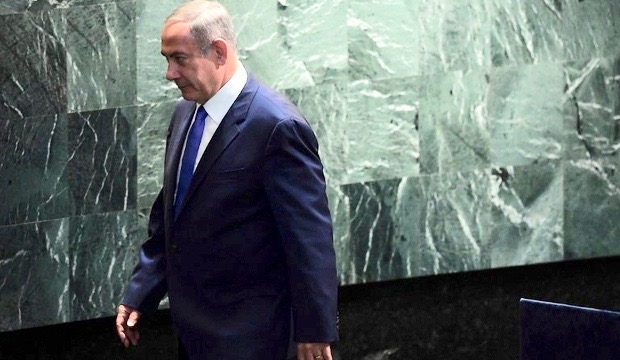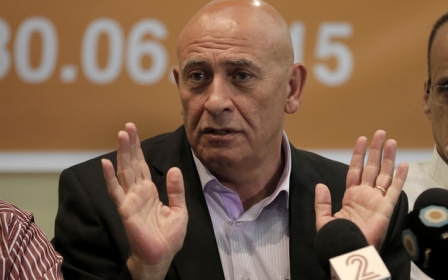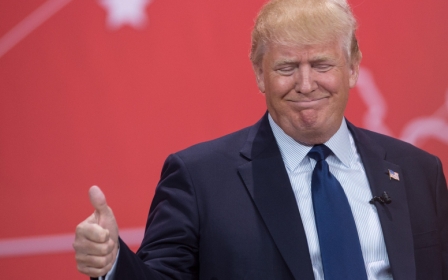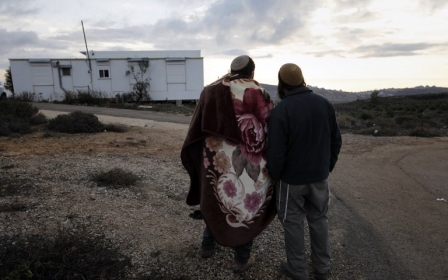US abstains as UN Security Council passes resolution against Israeli settlements

The UN Security Council on Friday passed a resolution demanding Israel halt building settlements in occupied Palestinian territories.
The United States refused to use its veto, abstaining from voting, while the 14 other countries on the 15-member council voted in favour of the resolution.
"One cannot simultaneously champion expanding Israeli settlements and champion a viable two state solution that would end the conflict."
-Samantha Power, US ambassador to the UN
US Ambassador to the UN Samantha Power said that because the resolution “reflects the facts on the ground and is consistent with US policy… we did not veto it.”
Israel’s UN ambassador criticised the US abstention, saying he had “no doubt” the forthcoming Donald Trump administration and new UN secretary general would usher in a different era in UN-Israel ties.
The resolution, brought to the vote by non-Arab nations, demanded that Israel "immediately and completely cease all settlement activities in the occupied Palestinian territory, including East Jerusalem", and said the establishment of settlements by Israel has "no legal validity and constitutes a flagrant violation under international law."
Power hit back at the Israeli criticism.
"The United States has been sending a message that the settlements must stop privately and publicly for nearly five decades," she told the Security Council after the vote.
"One cannot simultaneously champion expanding Israeli settlements and champion a viable two state solution that would end the conflict. One had to make a choice between settlements and separation."
Israeli Energy Minister Yuval Steinitz, who is close to Prime Minister Benjamin Netanyahu, said the United States abandoned Israel by abstaining from voting on Friday.
"This is a day of victory for international law."
-Saeb Erekat, Palestinian official
"This is not a resolution against settlements, it is an anti-Israel resolution, against the Jewish people and the state of the Jews. The United States tonight has simply abandoned its only friend in the Middle East," Steinitz told Channel Two News.
Power replied that “continued settlement building seriously undermines Israel’s security.”
US bipartisan outrage
The repercussions of the vote were felt at home as well for the US delegation, as Obama faced bipartisan outrage over the resolution.
Incoming Democratic Senate minority leader Chuck Schumer, who had urged Obama to veto the UN measure, took to Twitter to voice his frustration with the administration's abstention.
Other ranking congressional Democrats also sided with Trump and Israel against Obama.
Democratic Senator Richard Blumenthal described allowing the vote as "unconscionable".
US Representative Eliot Engel, a Democrat from New York, said Israel does not get a "fair shake" at the United Nations, which is why it needs the US veto. Engel criticised Obama for accepting the "one-sided, biased resolution".
US House of Representatives Speaker Paul Ryan and Senator John McCain, both Republicans, blasted the Obama administration's decision.
Ryan said in a statement the US abstention was "absolutely shameful" and a "blow to peace". McCain said in a statement the US move "has made us complicit in this outrageous attack."
Meanwhile, Palestinian officials hailed the resolution as a victory against the occupation. The Palestinian presidency said the vote was a "big blow" to Israel.
"This is a day of victory for international law, a victory for civilised language and negotiation and a total rejection of extremist forces in Israel," Chief Palestinian Negotiator Saeb Erekat told Reuters.
"The international community has told the people of Israel that the way to security and peace is not going to be done through occupation ... but rather through peace, ending the occupation and establishing a Palestinian state to live side by side with the state of Israel on the 1967 line."
The US decision to abstain was a relatively rare step by Washington, which usually shields Israel from such actions.
It is the first resolution the Security Council has adopted on Israeli-Palestinian conflict in nearly eight years.
The US abstention was seen as a parting shot by US President Barack Obama, who has had a difficult relationship with Netanyahu.
A resolution needs nine votes in favour and no vetoes by the United States, France, Russia, Britain or China to be adopted.
Resolution passed... finally
New Zealand, Malaysia, Senegal and Venezuela requested a vote after Egypt, under pressure from US President-elect Trump, sought to delay the measure.
The resolution drafted by the Palestinians and initially presented by Egypt on behalf of the Arab Group had unleashed a frenzy of lobbying by Israel to block it.
Egypt had circulated the draft to the council late Wednesday and requested a vote the following day, but backtracked just hours before that meeting.
“The sky is falling narrative on this just does not work. It is standard US policy that Israel’s actions on settlements have been and continue to be an impediment to peace.”
-Maya Berry, executive director of the Arab American Institute
The Egyptian presidency confirmed that the delay was decided during a phone call between President Abdel Fattah al-Sisi and Trump.
Israel had asked Trump to intervene after learning that Washington, in a reversal of its policy under Obama, would not veto the resolution, an Israeli official said.
"This resolution is a Palestinian initiative which is intended to harm Israel," said Israeli Ambassador Danny Danon after prospects for the vote were revived.
"We call on the United States to stand by us and we expect our greatest ally to continue with its long-standing policy and to veto this resolution."
'More than symbolical'
Maya Berry, executive director of the Arab American Institute, a Washington-based think tank, criticised Trump’s efforts to block the resolution, “when the resolution simply restates conventional world wisdom on the subject.
“The sky is falling narrative on this just does not work,” Berry told Middle East Eye. “It is standard US policy that Israel’s actions on settlements have been and continue to be an impediment to peace.”
She added that the two-state solution is becoming nonviable because of settlement expansion.
Despite media reports emphasising feuds between Obama and Netanyahu over the Iran nuclear deal, Berry said the US administration did not veto the resolution to emphasise Washington’s stance on settlements and the peace process, not to irk the Israeli government or Trump.
Berry said Democrats and Republicans denouncing Obama over the UN vote fail to see it within the context of US policy. She added that calling Obama’s decision anti-Israeli is a distraction.
“The reality is we have failed leadership when it comes to the Israeli-Palestinian conflict, and this was an attempt to get the world to pay attention and say one of the biggest barriers to finding a resolution is the continued settlement growth,” she added.
Berry joked that 2334, the number of the UNSC resolution might end up as a hashtag on social media, but she stressed its significance.
“While Israel has already announced that it won’t be bound by it, that just shun this particular Israeli government from the rest of the world community and demonstrates that it is not interested in making peace,” Berry said. “It’s more than a symbolical importance. It’s important that the world went on record and gave us a very clear indication of what the intent of this government currently operating in Israel is.”
Trump calls Sisi
The Egyptian turnaround surprised many but followed repeated expressions of admiration for Trump by Sisi, a former military chief who overthrew his Muslim Brotherhood-backed predecessor in 2013, leading Obama to temporarily suspend military aid to Cairo.
A Egyptian statement said "the two leaders agreed on the importance of giving the new administration a chance to deal comprehensively with all the aspects of the Palestinian cause to achieve a comprehensive settlement."
The French ambassador stressed that the draft resolution "does not exclusively focus on settlements. It also condemns the violence and terrorism. It also calls to prevent all incitement from the Palestinian side so this is a balanced text."
"The key goal that we have here is to preserve and reaffirm the two state-solution," said Francois Delattre.
Obama's administration has expressed mounting anger over the continued expansion of Jewish settlements in the occupied Palestinian West Bank.
"After becoming aware that the (US) would not veto the anti-Israel resolution, Israeli officials reached out to Trump's transition team to ask for the president-elect's help to avert the resolution," an Israeli official said on condition of anonymity.
Israeli settlements are seen as a major stumbling block to peace efforts, as they are built on land the Palestinians see as part of their future state.
Trump, who campaigned on a promise to recognize Jerusalem as Israel's capital, bluntly said that Washington should use its veto to block the resolution.
"The resolution being considered at the United Nations Security Council regarding Israel should be vetoed," he said in a statement before the vote.
"As the United States has long maintained, peace between the Israelis and the Palestinians will only come through direct negotiations between the parties, and not through the imposition of terms by the United Nations."
After the vote, Trump vowed that the country's policies at the United Nations will change after he takes office.
"As to the UN, things will be different after Jan 20th," he said on Twitter, referring to the date of his inauguration.
Trump has chosen as ambassador to Israel the hardliner David Friedman, who has said Washington will not pressure Israel to curtail settlement building in the occupied West Bank.
Middle East Eye propose une couverture et une analyse indépendantes et incomparables du Moyen-Orient, de l’Afrique du Nord et d’autres régions du monde. Pour en savoir plus sur la reprise de ce contenu et les frais qui s’appliquent, veuillez remplir ce formulaire [en anglais]. Pour en savoir plus sur MEE, cliquez ici [en anglais].




